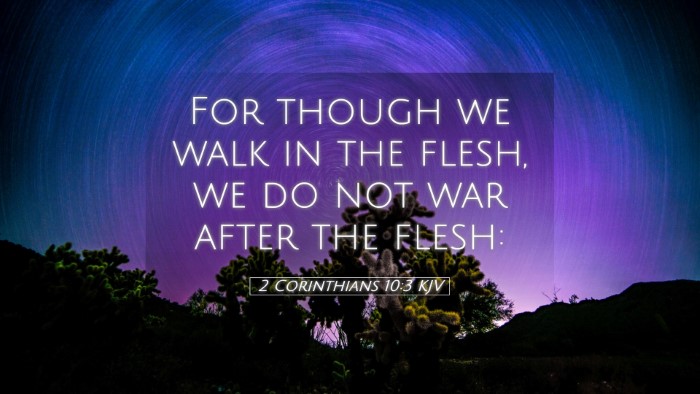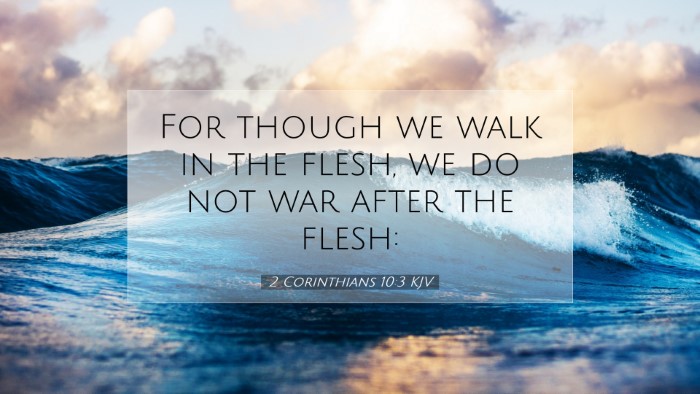Commentary on 2 Corinthians 10:3
Verse: "For though we walk in the flesh, we do not war after the flesh."
Contextual Background
In this verse, the Apostle Paul provides a significant insight into the nature of spiritual warfare and the Christian's approach to it. It is essential to understand that Paul writes this letter amidst a backdrop of false apostles and challenges to his authority. His statement here introduces a dichotomy between physical existence ("walk in the flesh") and spiritual realities ("do not war after the flesh").
Insights from Public Domain Commentaries
Matthew Henry's Commentary
Matthew Henry emphasizes the importance of recognizing the distinction between physical and spiritual battles. He asserts that while believers live in a physical body, their conflicts are not earthly but spiritual. This walk in the flesh refers to our existence in a physical world where temptations and trials emerge; however, the warfare, according to Henry, lies in the realm of the spirit.
Henry explores the implications of this verse, highlighting that Christians are engaged in warfare not against human adversaries but against spiritual forces of darkness (Ephesians 6:12). He notes that the Apostle Paul does not advocate a physical confrontation but rather promotes a reliance on divine resources for victory.
Albert Barnes' Notes on the Bible
Albert Barnes elaborates on the meaning of "walking in the flesh." He contextualizes it within the framework of human experience, acknowledging that though believers inhabit a physical body, their lives and actions reflect a spiritual calling. His exposition highlights that the nature of the conflict faced by believers involves unseen powers and principalities.
Barnes further comments on the phrase "war after the flesh." He points out that Paul acknowledges the everyday realities of life but contrasts them with the spiritual weapons available to believers, emphasizing that victory requires spiritual insight and divine strength rather than mere physical efforts. This perspective encourages believers to engage in prayer, faith, and reliance on God's grace as the primary means of overcoming adversities.
Adam Clarke's Commentary
Adam Clarke provides a detailed examination of the phrase "though we walk in the flesh." He interprets it to mean that while Christians are subject to bodily limitations and experiences, their true nature and existence are rooted in a higher calling and spiritual objectives. Clarke's analysis reiterates the need for divine assistance in spiritual warfare rather than human methodologies.
Clarke asserts that the weapons of the believer are not carnal; they include prayer, faith, love, and the Word of God, which are essential for combating spiritual challenges. His remarks suggest that understanding the nature of this warfare requires discernment and an acknowledgment of the ongoing battle against sin and evil influences.
Theological Implications
The theological implications of 2 Corinthians 10:3 are profound for pastors, students, and scholars alike. This verse serves as a reminder that human struggles and conflicts often mask deeper spiritual realities.
- Spiritual Warfare: This passage calls attention to the unseen spiritual battles that characterize the Christian life. Believers are challenged to look beyond the physical manifestations of their struggles and recognize the spiritual forces at play.
- Divine Resources: The contrasting ideas in this verse underscore the importance of divine empowerment. In spiritual warfare, reliance on God’s strength is paramount, as human efforts are insufficient against a spiritual enemy.
- Identity in Christ: Understanding that while we exist in the flesh, our true identity is in Christ, which allows believers to engage from a place of strength and authority in spiritual matters.
Conclusion
In summary, 2 Corinthians 10:3 invites believers to engage in a deeper understanding of their spiritual existence and the nature of their conflicts. Commentators like Matthew Henry, Albert Barnes, and Adam Clarke highlight the critical need for recognizing the spiritual dimensions of everyday life.
For pastors and theologians, this verse serves as a reminder to center their teachings on the power of God’s Word and the necessity of spiritual disciplines in overcoming life's battles. As we navigate our walks in the flesh, may we always remember that the true nature of our warfare is rooted in the spiritual realm, relying on the weapons God has provided for our victory.


